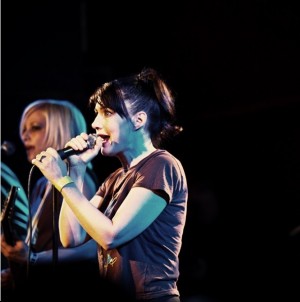Kathleen Hanna Puts the Grrr in Riot Grrrl: A Review of Documentary Film ‘The Punk Singer’
I’ll be the first to admit to my meager knowledge of the feminist framework. Indeed, I’d be hard-pressed to name any aside from those most prominent in the domain of women’s liberation — Susan B. Anthony, Simone de Beauvoir and the like. I’d be willing to wager, though, that Kathleen Hanna isn’t exactly a household name on the laundry list of women’s rights heroines, except perhaps on that of only the most die-hard of savants — or the most avid of record collectors. Sini Anderson’s first feature-length documentary The Punk Singer, by putting the glass-ceiling-busting punk rocker and activist center stage in an 83-minute amalgamation of interviews and gritty archival footage, effectively wedges the music, counter-cultural and third-wave-feminist icon into the memory bank.
In traditional profile-documentary fashion, Anderson starts at square one. In this case, a childhood marked by a lack of parental affection transitions quickly to Hanna’s days as an angsty teenage art student at Evergreen State College in Olympia, Washington. It’s here that her feminist inclinations begin to solidify, at least more overtly. Discovering live music performance to be the most powerful medium of personal message dissemination, the wild child forms girl-power ensemble Bikini Kill with three classmates. (She’s of course the uninhibited, man-crushing front-woman.) The group is a true byproduct of the grunge wave that took the nation by storm in the early ’90s, with the characteristic edgy, raw alt-rock sound grown out of the Pacific Northwest, but with Hanna’s distinctly radical lyrics oozing with feminist overtones.
The fledgling director proceeds to weave us through a timeline encompassing the founding of the Riot Grrrl zine and corresponding underground movement, the Bikini Kill breakup, and Hanna’s various post-Bikini Kill projects: her low-fi, bedroom-recorded solo album Julie Ruin; the formation of feminist-party-band power trio Le Tigre, which heralds a newfound songwriting maturity and a watered-down in-your-face-ness while maintaining a distinctly pro-X-chromosome voice; and the debut of the musician’s present-day outfit, The Julie Ruin. As you could imagine with a polarizing and antagonizing figure such as Hanna, dissent, threats and character smearing follow her lockstep, adding a bit of intrigue to Anderson’s depiction, even if it’s only a light sprinkling.
It’s easy to see why the documentarian honed in on this particular punk singer for her feature-film coming-out. With a distinct anti-Establishment look and “fuck the world” persona, Hanna is very much derived from the same genome as hard-rocking predecessor Joan Jett (an interviewee in the Punk Singer) — except with a radical mutation:
Exhibit A: creative bits of flair, like the word “slut” penciled ironically in black upper-case lettering across her belly and knuckles, as if she’s begging some cocky lad to pronounce the insult to her face; Exhibit B: a wholly non-conformist performance style, which, in between songs of throaty lyrical beltings, sees the front-woman preach to audiences like a gifted orator and vehemently scorn those criticizing her camp; Exhibit C: a self-described and quite unexpected Valley Girl accent, hinting Beverly Hills babe rather than hardcore activist-musician.
Idiosyncrasies like these mesh to create a captivating figure of third-wave feminism — an embittered, rough, sexy, even funny role model challenging the entrenched notion of what it means to be female.
If only the film were as badass as the actual character. Anderson sets up her subject’s personality and career well — I certainly found myself intrigued by Hanna’s behavior and philosophies — but ultimately my attention and interest began to wane in the film’s latter half. Perhaps the most notable critique is something I would describe simply as a void, an intangible chasm I felt after the screen went black, like an ill-satiated thirst. While we become familiar with Hanna and her pioneering influence on culture and gender perception, Anderson’s is a topical treatment that doesn’t delve much below the surface. It’s much like an encyclopedia entry one might find under “Hanna, Kathleen” or “modern-day feminism.” The vocalist’s emotional shell is pried off a bit during brief scenes of perceived vulnerability, but all in all it’s difficult to forge an emotional tie to the protagonist and her various successes and adversities (which could have more to do with the musician’s with-me-or-against-me attitude than the actual filmmaking).
It doesn’t help that interviews with friends, admirers, bandmates and academics, even Hanna herself, seem slightly awkward and clumsily set up at times. Coupled with the director’s reliance on a formulaic, wholly linear story structure that affords little surprises or guesswork, there’s a lot to be desired.
There are those who would perhaps dismiss these assertions as purely masculine bias, or even overblown machismo. I imagine Hanna reacting with a swift middle finger or an earful of expletives. Shortcomings of The Punk Singer aside, though, Anderson has made a solid foray into feature-documentary territory, crafting a convincing biopic of an underappreciated and relatively unknown feminist figure and her accomplishments. For those seeking a well-rounded portrait, however, be warned: This is a fairly one-sided affair, and additional research will be required.
Rating: 2 out of 4 stars
“The Punk Singer” was released on November 29, 2013. For a full schedule of screenings across the nation, please visit http://www.thepunksinger.com/see-the-film.html. “The Punk Singer” can also be viewed on iTunes, Amazon Instant and VOD for $6.99.
Video Courtesy of: IFCFilmsVOD.

Featured image: Punk rock singer Kathleen Hanna. Photo Courtesy of: Christy Pessagno. An IFC Films release.

